& Construction

Integrated BIM tools, including Revit, AutoCAD, and Civil 3D
& Manufacturing

Professional CAD/CAM tools built on Inventor and AutoCAD
7 min read
Reflect on the past year with us, from product announcements to new features, in this comprehensive Fusion 2023 year in review.

2023 was a big year for Autodesk Fusion. Not only was it our 10-year anniversary, (cue “Happy Birthday” song), but we also delivered six major product updates focusing on new and improved features across all Fusion workspaces and made key announcements that showcased our future product vision.
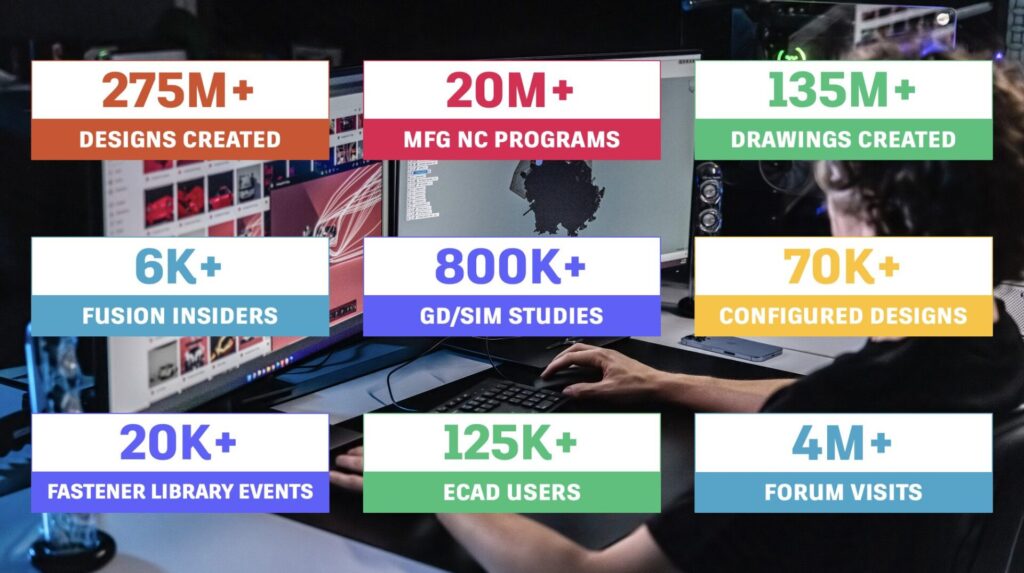
Before we review this year, we want to thank all of you for your continued passion, creativity, and support. In 2023 alone, you created over 275M designs, 135M drawings, 20M NC programs, and more. Needless to say, we wouldn’t be where we are today without all of you.
This year at AU23, we shared more details about our long-term vision for Autodesk Fusion and how we plan to get there. Let’s quickly recap two of the largest announcements.
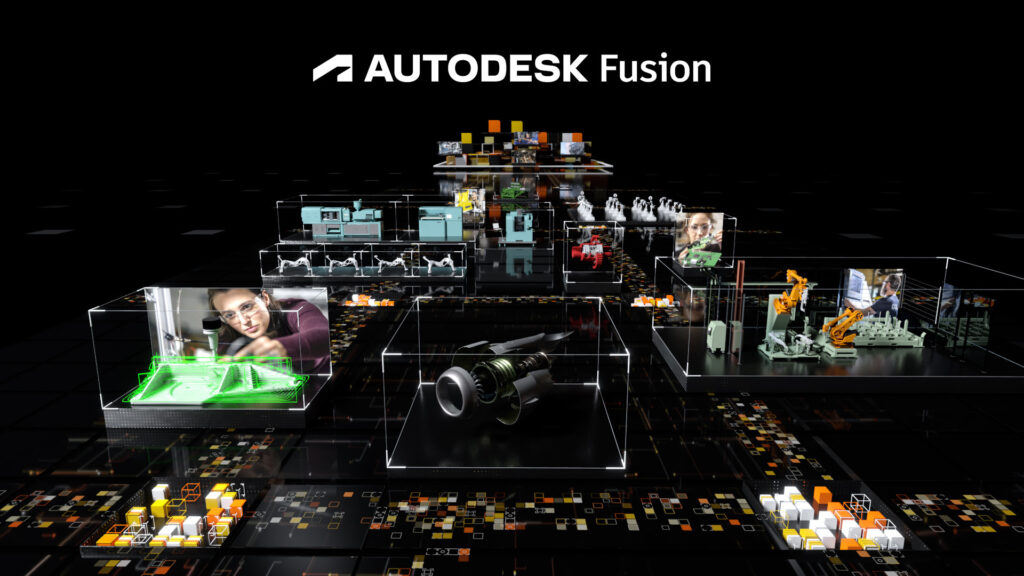
Imagine if you could achieve productivity gains, make better decisions, and maintain a competitive advantage by unlocking the value of an open data model and automation tools. Imagine if you could further bridge the gap between engineering, development, machining, and business processes. The Fusion industry cloud for manufacturing will represent a new era of connected data and collaboration for individuals, teams, and entire organizations to design and make anything.
Demand for new products and ideas is accelerating across the design and manufacturing industries. With expectations to do things faster, at lower costs, and higher quality, harnessing the power of AI is no longer a nice-to-have—it’s now a must to keep up. We’re currently developing Autodesk AI, technology that augments creative exploration and problem-solving, automates tedious and repetitive tasks, and analyzes project data to offer predictive insights.
Now, let’s take a look back at key feature highlights from 2023, from new ways to maximize your design process to more efficient toolpath strategies.
With each Fusion release, we aim to improve the speed with which you can get things done through computational and workflow performance enhancements. Beyond the in-the-weeds usability and performance improvements we made this year, we also delivered two game-changing updates.
The first is a refreshed sign-on experience that’s consistent with other Autodesk products and adds an additional layer of security through single sign-on (SSO). The second is enabling Fusion to run natively on Apple Silicon, which lets Apple M1 or M2 computer users leverage everything their machines have to offer.
The workspace you know and love got even more powerful this year thanks to a few milestone new features, along with general performance enhancements.

Configurations in Fusion provide an intelligent way to maximize the utility of your parametric designs. They allow you to create and manage multiple design variations from a single, unified model, enabling unprecedented flexibility in design and manufacturing workflows.
You wanted an easier way to insert fasteners into your 3D models, and we listened. Fusion now has a Fasteners Library. To access it, simply select the Fastener icon to access a vast library of nuts, bolts, and washers.
The new ‘Duplicate with Joints’ command enables you to duplicate a component or subassembly that has joints associated with it and quickly joint it in one or many additional locations. This is a massive workflow efficiency improvement and helps speed up the previously tedious task of copying and jointing components.
The Drawings workspace in Fusion saw a plethora of enhancements this year that further streamlined the drawings workflow. Among them are Copy with Drawings, which lets you copy a design and its related drawings, Surface and Mesh support, allowing you to seamlessly create 2D drawings of Mesh and Surface Models, and the ability to place Model Properties and Model Parameters into any text field on your drawing.
(Oh, and you heard it here first: something big is coming to the drawings space next month, so stay tuned.)
Whether you’re into additive or subtractive manufacturing, there is sure to be something this year that has the potential to completely change the way you work. Let’s take a look back at some of our favorite new features across the full manufacturing spectrum.
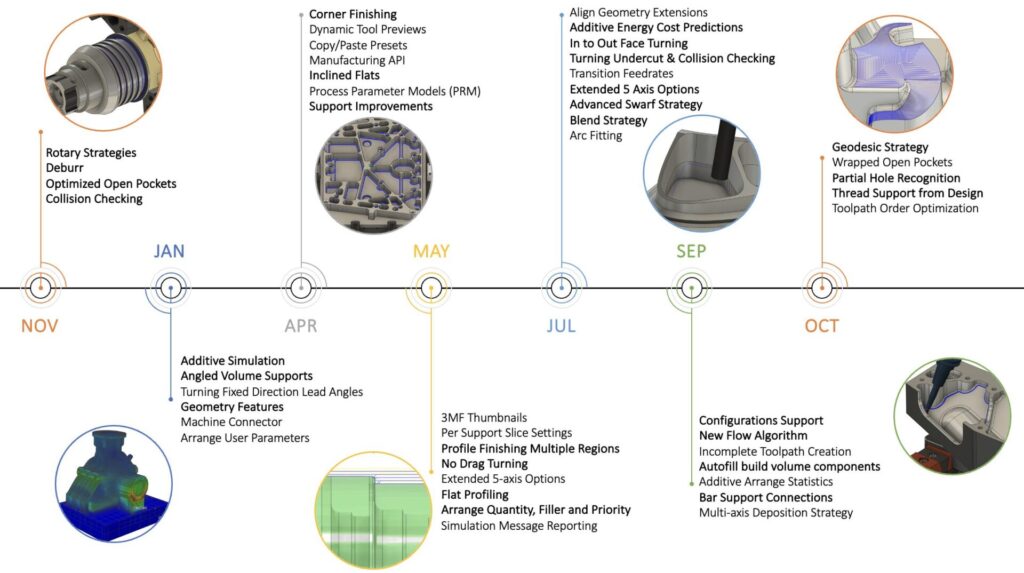
Throughout this year, we focused on providing you with features that allow for more flexibility with your day-to-day operations. Part of this effort meant releasing new and exciting milling toolpaths to automate your manufacturing process, and the other part involved making quality-of-life enhancements and updates to our Tool Library and Machine library.
The Deburr Toolpath Strategy automatically detects all of the external sharp edges and removes remaining burrs across the entirety of the part, the Geodesic Toolpath Strategy allows freeform surfaces to be machined using either a Blend or Scallop type, and Incline Flats for the Flat Machining Toolpath detects your defined tilt angle range and finds and cuts all the flats within that range.
Allow Inside to Outside for Face Turning gives you the ability to face a part starting from the smallest diameter and working your way out to the largest. Machine Groove Undercuts for Profile Finishing lets you move vertically into the undercut region to allow the finish machining of the undercut diameter. Last but not least, Back Wall Collision Checking for Undercuts for Groove Finishing helps you minimize potential collisions while maximizing the undercut area.
Additive Manufacturing has been a massive game changer in the way we dream, prototype, and create. This year, we added numerous additive advancements to help you create more sustainable designs, increase efficiency, and optimize workflows.
Additive Simulation helps you visualize your build process before sending it to your machine to determine the warp and deformation characteristics of your build. FFF Energy Consumption Prediction lets you see the energy and filament costs associated with your print from within Fusion. Angled Volume Support lets you introduce a pivot point in the support path, so that the support structure can bend around that point to keep away from surfaces directly below the supported face.
Our robust additive capabilities also led us to new heights — Fusion took home the Software Tool of the Year award at the 2023 3D Printing Industry Awards!
We’re committed to providing you with tools that can help you streamline and optimize your tedious workflows. This year, we took steps to democratize design automation tools and improve our generative design and simulation tools.
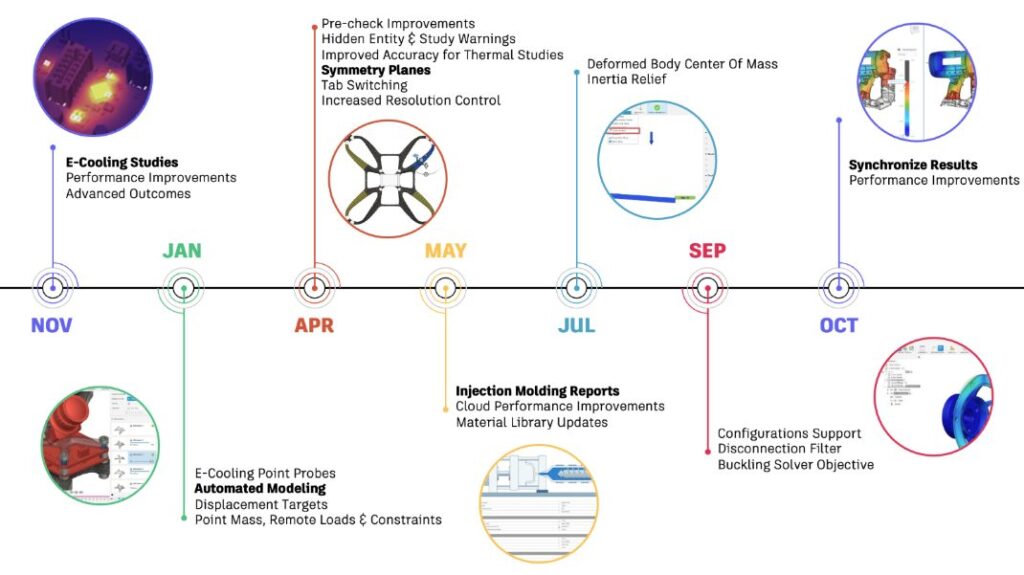
In January 2023, automated modeling graduated from preview to a commercial feature for all Fusion subscribers, including students. In just minutes, automated modeling provides multiple, editable design alternatives based on the surfaces you want to connect and the bodies you want to avoid.
Previously available as part of our Experimental Generative Solvers and Features preview, the Symmetry Plane option is now officially part of the Generative Design Extension. This tool enables you to define up to three orthogonal planes of symmetry to enforce the design outcomes and drive symmetric editing in the Tspline form body.
You can now generate customized reports for Injection Molding Simulation studies. You can even preview what your report would look like and make necessary changes before you generate the report.
Alongside a few key announcements, we prioritized performance improvements to the Electronics workspace this year, leading to substantial results including faster file loading times and enhanced electromechanical capability performance.
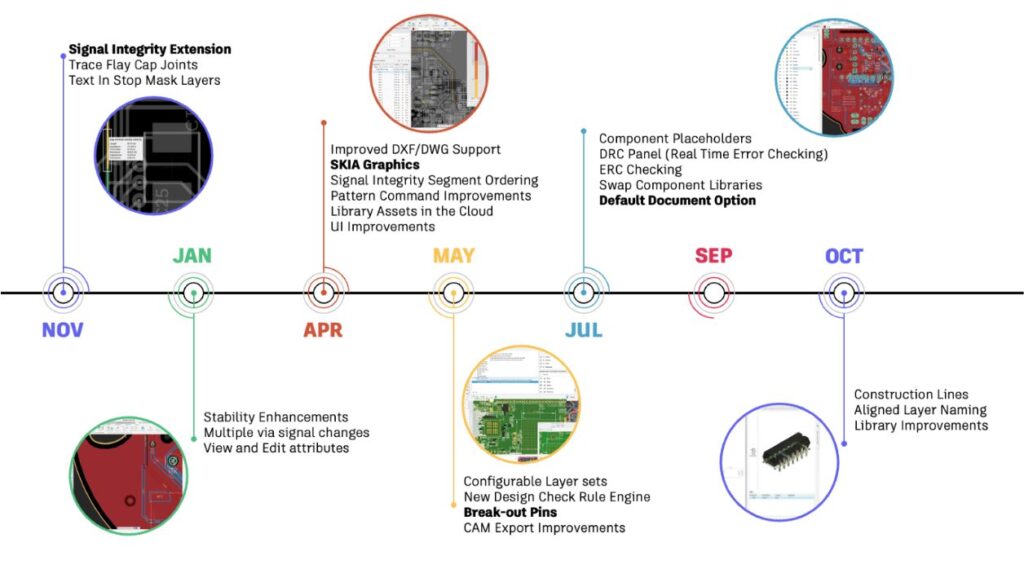
Our new partnership with Cadence Design Systems came as another exciting announcement during AU23 and reinforced our commitment to the electronics design and engineering community. Our integration with the leader in electronic systems design tools connects specialized Cadence PCB technologies directly with Autodesk Fusion, advancing its powerful CAD, CAM, and PCB design capabilities to streamline ECAD to MCAD workflows and transform smart product design.
Earlier this year, we released the option to customize your Default Document Preference to either Design or Electronic Design. By selecting Electronic Design as your preference, Fusion will launch directly in the Electronics Workspace. This eliminates the multiple steps previously required to access the Electronics Workspace from the Design Workspace.
Above all, we value you, our community. You drive us to continue developing the best integrated CAD,CAM, CAE, and PCB tool on the market. Stay tuned for our 2024 product roadmap coming soon. What’s your Fusion resolution going into the new year? Let us know in the comments.
By clicking subscribe, I agree to receive the Fusion newsletter and acknowledge the Autodesk Privacy Statement.
Success!
May we collect and use your data?
Learn more about the Third Party Services we use and our Privacy Statement.May we collect and use your data to tailor your experience?
Explore the benefits of a customized experience by managing your privacy settings for this site or visit our Privacy Statement to learn more about your options.